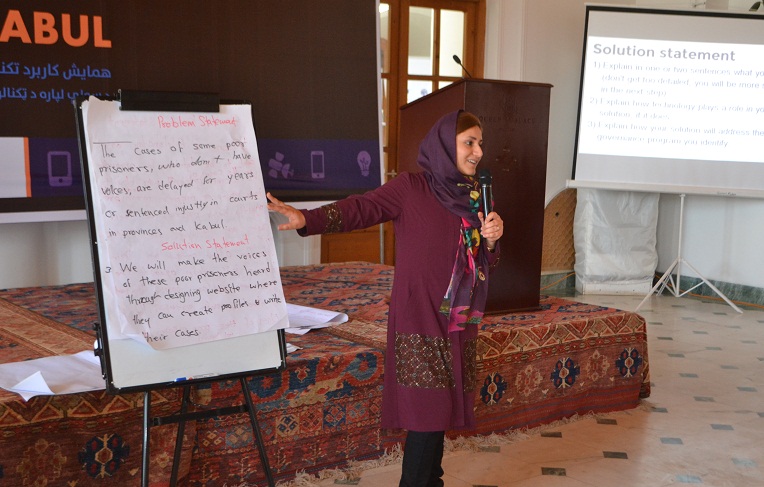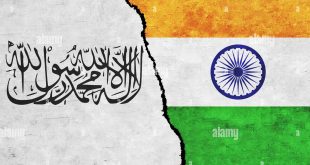By M. Nadeem Alizai-Social media is becoming a powerful force in national politics. Issues that are ignored by the mainstream media are highlighted by the social media users. Once there was a time when major news channels and newspapers in Afghanistan served as major source of information for Afghans using social media. However, Facebook and Twitter have become so popular in the country that it shifted the balance. If social media was a city it would be the capital city of Afghanistan.
Growing number of social media users in the country have given birth to some questions such as ethics, credibility and effective use of Facebook, Twitter, YouTube and other platforms for social change.
A graduate of law faculty, Raziya Masumi, has rolled up her sleeves to address the problems and promote effective use of social media. She is working in the field of social media and was one of the organizers of the Afghan Social Media Summit, which was held in 2013, 2014 and 2015. Kabulscape talked to her about role of social media in uplift of the country.
The following is an excerpt of her interview with Kabulscape.
Kabulscape: How do you see future of social media in Afghanistan?
Masumi: Social media has bright future in Afghanistan and most Afghans, especially youth, are using it. The social media summits have had a positive impact on Afghans and will be published soon, and will therefore, attract more audiences. It is also encouraging social media users to learn about the unique culture of using social media. All the educational and cultural programs can be reflected within the usage of social media. Social media is changing its way for becoming institutionalized within Afghanistan and is well used by Afghans.
Kabulscape: Tell us about popularity of social media among young Afghan people, especially girls and women?
Masumi: According to the statistics of the Ministry of Communication and Information Technology, about 1.2 million Afghans are using different platforms of social media like Facebook, Twitter, Instagram and others. About 75% of the users are men and 37% of the users are women, which show the low engagement of women in social media.
Kabulscape: Do you think that social media is more powerful than print and electronic media? How?
Masumi: Yes, because social media has its own power and it has a more worldwide presence than print and visual media. In short time, it can spread the news out to people even to the far most areas, which the other media can’t reach and cover. However, via social media it is possible to tell the truth and reflect the crime or the achievement, which the other media can use as a source. A good example of this is the picture of Mujtaba, the six years old child fan of Messi, who wore a plastic jersey. It went viral on social media and became newsworthy itself and then all the local and international media was talking and broadcasting this news. Another important but shocking news which went viral on social media was the killing of Farkhunda by an angry mob. The brutal killing led to many large-scale demonstrations in different Afghan cities and countries. There are several other examples indicating how powerful social media has become.
Kabulscape: Why young people use social media more than reading newspapers and magazines?
Masumi: People turn to social media because the newspapers and magazines can’t publish all the news as quickly as it happens and it will take time to publish it and also its publications requires steps before it is clear for printing. However, social media is a platform for news where people can share news anytime from any place. During the presidential election in 2014, we witnessed election irregularities and social media allowed citizens to publish all the news about it as it happened. Unfortunately, violence against women is taking place in different areas of the country which is also reported through social media.
Kabulscape: How social media can empower women?
Masumi: Social media is an opportunity for women to share and raise their voice and tell of things that we do not hear about. It is also very useful for active women who have achieved a lot in society. They can have gatherings and bring about greater unity among women via social media to generate shared achievements. We have also witnessed social media campaigns aimed at combating street harassment of women. In this regard there is an application created by the name of “Harim” that can give reports on street harassment. Other campaigns to end forced and early marriages and encourage families to send their daughters to schools are a step to empower women.
Kabulscape: How we can use social media for Afghanistan’s development?
Masumi: It is the age of social media and technology. Social media is a tool for raising the level of culture in our society for mobilizing citizens for social good within different aspects of this culture, for quick development and for increasing public awareness about different governmental and private sectors affairs. This is necessary for improving transparency in the country and for this, social media can introduce the elites in the country to regular people. Especially, Afghan inventors and entrepreneurs can use social media for introducing their initiatives to help our industrial sector in the country, meet the needs of citizens and to also stop them from leaving the country. Also, the government can use social media for reporting about their programs in every province and district to bridge trust deficit between the government and public.
Kabulscape: Do you have any strategy to help female social media users to protect their rights?
Masumi: For protecting women’s rights while using social media we need to increase our reach to women through large campaigns via social media because unfortunately, women are unsafe in the virtual world. On basis of existing traditional perspectives and extremists ideas Afghan women are always cornered. However, those active women in social media shouldn’t be silenced and they need to defend their rights in the virtual world. We have to start from somewhere. Beginning of this work is not easy to institutionalize women’s rights in social media and to be free from every kind of harassment. I think every governmental organization’s public communication department should use social media because most communications take place on social media. Parliament should also draft and approve rules and laws that protect women in social media and punish the harassers. Today, the most popular brands or new brands that have an impact on the business world use social media for introducing their products. Afghan businesswomen should also use social media for this purpose. They can become well-known by using social media platforms.
Kabulscape: How women and girls can get attention of the government through social media?
Masumi: Afghan women have taken positive step in politics and increased their active role in parliament. Furthermore, some ministries reflect the attention that the government is paying to women’s roles but we must also mention that women have improved their abilities in management and leadership roles and accountability. There are active and talented women and by hiring and supporting them, the different government departments will further develop our society and the violence we see will decrease even more. Not only the Ministry of Women’s Affairs but other ministries shall also device women-friendly policies and emphasize on the role of social media for introducing women to work in public sector. There is no denying to the fact that Afghan women in remote areas are suffering from domestic violence and are losing their lives. Most of these shocking incidents are shown on social media. If the government follows these cases, launch investigations and punishes the criminals, it will further support women in our society. Today, we are seeing out-dated customs such as child marriages. During childbirth, women lose their lives or barely survive. For combating such ideas and prejudices, we need to launch massive mobilizations and activism campaigns. Social media is a powerful tool for public awareness because people in different parts of the country are now using it and it will continue to be more widely used in the future by Afghans.
Kabulscape: Do you think that ethics should be formulated to control behavior of social media users?
Masumi: One of the rules of using social media as part of ethics is don’t insult others in the virtual world or question someone’s personality. It is a form of harassment and will annoy the users. Unfortunately, the culture of using social media has not been institutionalized. Users who are writing insulting posts are not held accountable. Also some people posts annoying and violent pictures on social media, which is shared when clicked, it is like that the violent action is being repeated again and again and it has a very bad effect on the public’s mind. There must be ethics and rules to prevent people from uploading such pictures that upset public opinion. Before every post the user creates should be checked before it is posted.
Kabulscape: It has been observed that many users of social media are involved in propaganda which is damaging the national unity, how can we deal with this problem?
Masumi: Social media users come from different tribes and ethnic backgrounds in the country. We have great examples in social media campaigns and public gatherings which show the public from different ethnic backgrounds becoming more open-minded. After social media campaigns, survivors of the deadly blast in Paktika province, who were playing and watching volleyball, were brought to Kabul for treatment. These campaigns on social media encouraged people to donate blood. The donors were from different ethnic backgrounds. They tried to save the children with their blood. Afghans congratulated each other on victories in sports. Social media users organized a demonstration in Kabul when 31 passengers were abducted in Zabul. People from different ethnicities gathered and expressed solidarity with families of the kidnapped passengers.
For fighting propaganda on social media, the government should take action against those who are damaging the national unity. Social media is a powerful tool which could be used by the government to foster national unity.
Kabulscape: What is the role of social media in promotion of citizen journalism?
Masumi: Citizen Journalism is one of the newest forces that have entered the journalism world. Citizens who feel responsible will try to tell the truth as part of their tribute citizenship. Social media is a universal tool and facilitates the efforts of citizens who share their stories and news. We are reading and watching different types of news being shared on social media about economy, social issues, security, health, education, ports and culture. One of the programs in my professional career is the “Paiwandgah” citizen journalism platform. Via this platform our citizen journalists send us their reports from different provinces. One of the hot topics which were reported through this platform was the issue of mass exodus of Afghans. We received many reports about people who left Afghanistan and came back or faced difficulties during their trip. We published the stories on Paiwandgah and on our social media pages. The Paiwandgah platform was launched during 2014 presidential elections. We received around 1,000 reports from our citizen journalists from different provinces. We saw that other media outlets were using these reports. We also organized training workshops on use of social media and citizen journalism in Helmand, Balkh, Sar-i-Pol, Jowzjan, Ghazni, Herat, Kapisa, Baghlan, Bamiyan, Kunduz, Khost, Kandahar, Takhar and Badakhshan provinces. Social media reflects citizens’ voices and is a big source of information and reporting, because each citizen can use it easily.
Kabulscape: What suggestions or programs you have to promote healthy use of social media for development of the country?
Masumi: Growth in social media usage has been observed in Afghanistan. We held three “Afghan Social Media” summits in 2013, 2014 and 2015 in Kabul City and invited fellowships from 27 provinces of the country. We held different workshops during the summits about the different social media platforms and how Afghans can use it professionally in their field. Keeping the experience in view, I will urge the government to conduct such programs and workshops at universities, schools, ministries and other organizations to help Afghans know more about social media because it can make ones’ works and mobilizations easier and it is very crowd-friendly tool.
 Afghanistan Times Latest News and Analysis from Afghanistan and the Region
Afghanistan Times Latest News and Analysis from Afghanistan and the Region




